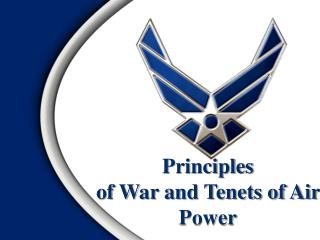 Nations and their cultures have flourished or perished based on the outcome of these epic fights.
Nations and their cultures have flourished or perished based on the outcome of these epic fights.
 Source for information on Principles of War: The Oxford Companion to American Military History dictionary.
Source for information on Principles of War: The Oxford Companion to American Military History dictionary.
There are nine Principles of War. He referred to this as the strategic choices and territorial lines, i.e., how and where to fight. FOREIGN INFLUENCE UNITED STATES Clausewitz influenced Communist and Soviet leaders such as Karl Marx, Mao Zedong, Vladimir Lenin, and Friedrich Engels. Major O. F. Winship , Assistant Adjutant General , U. S. A., Lieut. Objective, Offensive, Mass, Economy of Forces, Maneuver, Unity of Command, Security, Surprise, and Simplicity are the principles of war most often found in military manuals. Baron de Jomini, Summary of the Art of War, or a New Analytical Compend of the Principle Combinations of Strategy, of Grand Tactics and of Military Policy. They are objective, offensive, mass, economy of force, maneuver, unity of command, security, surprise, and simplicity. Below is a brief description and a crosswalk of each principle of war to business; it’s not surprising to see the similarities and overlap. Military Theory and Strategy Lsn 2 ID & SIG: Clausewitz, Corbett, Douhet, forms of maneuver, Jomini, Mahan, Mitchell, principles of war, Sun Tzu Agenda Key Theorists ... – A free PowerPoint PPT presentation (displayed as a Flash slide show) on PowerShow.com - id: 3b5be3-NDViZ Jomini PowerPoint PPT Presentations. All Time. Principles of warfare: Clausewitz and Jomini Principles of warfare: Clausewitz and Jomini Introduction Clausewitz defined war as an act of violence to force an opponent to fulfill our will. FOREIGN INFLUENCE UNITED STATES Clausewitz influenced Communist and Soviet leaders such as Karl Marx, Mao Zedong, Vladimir Lenin, and Friedrich Engels. Fundamental principle of war. THE BIG PICTURE: WHO DID THEY INFLUENCE? Principles of War. Source for information on Principles of War: The Oxford Companion to American Military History dictionary. ... or a New Analytical Compend of the Principle Combinations of Strategy, of Grand Tactics and of Military Policy. THE BIG PICTURE: WHO DID THEY INFLUENCE? The Clausewitz Homepage is an expansive collection of texts, articles, papers, bibliographies in multiple languages, graphics, videos, and other information concerning the extremely influential, respected, and yet controversial Prussian military thinker and strategist Carl von Clausewitz (1780-1831). Scope: Jomini provides immutable, scientific principles for the conduct of war. Baron de Jomini, Summary of the Art of War, or a New Analytical Compend of the Principle Combinations of Strategy, of Grand Tactics and of Military Policy. Evidence: Jomini supports his work based on historical analysis and his personal experience. Central Proposition: Analysts can make the study of warfare “scientific,” yielding a “strategy” with prescriptive techniques for military analysis and planning. One of the principles of war that Jomini emphasized was the “line of operation.” According to him, this was an essential warfare principle, which he categorized as topographical barriers, i.e., natural lines of operation. Reflections on lausewitz and Jomini: A iscussion on Theory, MMP, and esign in the Post OIF Army by Christopher Otero What this task requires in the way of higher intellectual gifts is a sense of unity and a power of judgment, raised to a marvelous pitch of vision, which easily grasps and dismisses a thousand
 Nations and their cultures have flourished or perished based on the outcome of these epic fights.
Nations and their cultures have flourished or perished based on the outcome of these epic fights. Source for information on Principles of War: The Oxford Companion to American Military History dictionary.
Source for information on Principles of War: The Oxford Companion to American Military History dictionary. Nations and their cultures have flourished or perished based on the outcome of these epic fights.
Nations and their cultures have flourished or perished based on the outcome of these epic fights. Source for information on Principles of War: The Oxford Companion to American Military History dictionary.
Source for information on Principles of War: The Oxford Companion to American Military History dictionary.